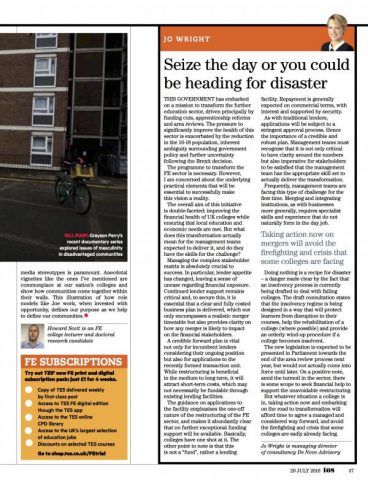This Government has embarked on a mission to transform the Further Education (FE) sector, driven principally by funding cuts, apprenticeship reforms and Area Reviews. The pressure to significantly improve the health of this sector is further exacerbated by the reduction in the 16-18 year old population, inherent ambiguity surrounding government policy and a further uncertainty following the Brexit decision.
“The programme to transform the FE sector is necessary, however we are concerned about the underlying practical elements that will be essential in the successful outcome of this vision.” Jo Wright, Managing Director De Novo Advisory.
The overall aim of this initiative is double faceted – improve the financial health of UK colleges whilst ensuring that local education and economic needs are met. We consider, what does this transformation actually mean for the management teams expected to deliver it, and do they have the requisite skills to take on the challenge?
Jo continues “Managing the complex stakeholder matrix is absolutely crucial to success. In particular, lender appetite has changed leaving a sense of unease regarding financial exposure. Continued lender support remains critical, and to secure this, it is essential that a clear, fully costed and robust business plan is delivered, which not only encompasses a realistic merger timetable, but also provides clarity on how any merger is likely to impact the financial stakeholders. We have many years’ experience of stakeholder management and we recognise their demands can at times be overwhelming, especially when interests are not wholly aligned. Having the right expertise to effectively manage the stakeholder matrix is another key element.”
A credible forward plan is essential not only for incumbent lenders considering their ongoing position, but also for applications to the recently formed Transaction Unit. Whilst restructuring is beneficial in the medium to long term, it will inevitably attract short term costs, which may not necessarily be fundable through existing lending facilities. In cases where funding cannot be secured from elsewhere, there is now a Restructuring Facility (within the Transaction Unit) available to support the implementation of recommendations from the Area Reviews.
The guidance on applications to the facility emphasises the one off nature of the restructuring of the FE sector, and makes it abundantly clear that no further EFS (Exceptional Funding Support) will be available to colleges post implementation of the Area Review recommendations.
“Basically, colleges have one shot at it. The other point to note is that this is not a ‘fund’, rather a lending facility ie repayment is generally expected on commercial terms, with interest, supported by security. As with traditional lenders, applications will be subject to a stringent approval process, hence the importance of a credible and robust plan, which is where our experience can be invaluable. Management teams must recognise that not only is it critical to have clarity around the numbers, but it is also imperative that stakeholders are satisfied there is an appropriate skill set within the management team to actually deliver the transformation. In our experience, this is an area where many colleges would benefit from help. The nature and mix of skills must evolve and adapt in line with the structure of institutions changing, and as funding is reallocated. Frequently management teams are facing this type of challenge for the first time. Merging and integrating institutions, as with businesses more generally, requires specialist skills and experience, that do not naturally form of the “day job”. Management teams should look to engage with us early in the process, and leverage our expertise in helping them manage successfully through the change process; specifically, timely help with applications to the new Facility is fundamental.” advises Jo.
Doing nothing is a recipe for disaster, as is clear from the one off nature of the Facility and also the fact that an insolvency process is currently being drafted to deal with failing colleges. The draft consultation states that the insolvency regime is being designed in a way which will:
- protect learners from disruption to their courses
- help the rehabilitation of a college, where possible
- provide an orderly wind-up procedure if a college becomes insolvent
The new legislation is expected to be presented in Parliament towards the end of the Area Review process next year, although would not actually come into force until some time later. The potential use of the new insolvency mechanism should not be underestimated; it is being introduced for a reason. De Novo’s help in managing through the changing landscape can help colleges avoid becoming an early statistic in the new insolvency regime.
On a positive, amid the turmoil in the sector, there is some scope to seek financial help to support the unavoidable restructuring and transformation. The guidance from the Unit encourages early applications, directly following output from the Area Reviews, and gives clarity on the criteria required to support an application.
Colleges can benefit from our support to ensure their plans are robust and have the best prospects of securing the financial help sought. The expectations for the standard of applications is high, and are broadly aligned to those of traditional lenders. De Novo Advisory’s extensive knowledge and understanding of the lenders and their demands can be a vital ingredient in securing a positive outcome to an application.
Colleges that lack the skills and resources essential to facilitate a credible application, as well as the skills more broadly required in managing through the transformation process, must seek help before time runs out. As the facility also includes provision for professional fees, this expense in itself should not be a barrier to engaging the right expertise at the right time if long term viability is to be secured.
Jo concludes “Whether it’s help with an application for funding, stakeholder management, business planning, merger or integration, taking action now and embarking on the road to transformation, will afford time to agree a managed and considered way forward, and avoid the fire fighting and crisis that some colleges are sadly already facing.”










